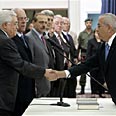
Palestinian emergency cabinet sworn in
Abbas swears in government to replace unity coalition he dismantled after Hamas took control of Gaza by force; Hamas says new government illegal. Palestinian president also issues decree outlawing Hamas' armed groups
The cabinet is led by respected economist Salam Fayyad, who will also serve as finance minister. It was sworn in by Abbas in the Muqata'a in Ramallah. Hamas said the emergency government was illegal.
Fayyad announced in a prerecorded televised speech that he would freeze the funds in the treasury of the outgoing government, which continues to operate in Gaza as a Hamas government.
The new prime minister made it clear that his government would operate both in the West Bank and in the Hamas-controlled Strip and referred to the events in Gaza as "ugly." He stressed the government's desire to work to rehabilitate the Palestinian Authority and help Palestinian civilians.
Fayyad said that restoring security was a difficult, but not an impossible task.
"The first piority of our government is security and the security situation," he told reporters later. "The mission will be difficult and hard, but not impossible."
Abdul Razek Yihya was sworn in as the government's interior minister. Yihya filled this role a few years ago, and was forced to resign after not succeeding in uniting the defense staffs.
The minister will have to focus the staffs' actions in the West Bank and try to revive the Palestinian Authority's defense staffs in the Gaza Strip.
The emergency government contains 12 ministers. PA Presidency secretary-general Tayeb Abdul-Rahim said that more ministers will be presented in the near future.

New Palestinian government (Photo: AP)
Abbas said Sunday that the top priority of his new government was to bring about an end to the international aid embargo. He said the emergency cabinet was a government of all Palestinians.
"This is our government, the government of the Palestinian people in the West Bank and Gaza," he said. "The first goal we are working to achieve is to end the siege and have a unique relationship with all the nations."
He said he was determined to enforce law and order, "because there is one authority, one law and one legitimate gun in all areas of our homeland, in the West Bank and Gaza."
Hamas spokesman Sami abu-Zuhri said that his movement had a number of ways of dealing with developments following the swearing in of the Palestinian emergency government in Ramallah, calling it "the peak of illegal political thuggery".
Abu Abir, spokesman of the Popular Resistances Committees, said that if Israel tried to increase pressure and the embargo on the Palestinians in Gaza, "it too would suffer a blast which will first and foremost affect the Israelis."
'Members of armed groups will be punished'
Abbas on Sunday also issued a decree outlawing the armed groups of Hamas and said members would be punished. The ban applies to the Hamas militia, known as the Executive Force, and to Hamas' other armed groups, according to a decree issued by Abbas and obtained by The Associated Press.
Abbas wrote that he decided to "consider the Executive Unit and the militias of the Hamas movement illegal, due to their military coup against the Palestinian legitimacy and its institutions."
"Anyone who is involved in any of these two groups is going to be punished, according to the law and the orders of the state of emergency," the decree said.
Barely formed, the Palestinian emergency government put forward by newly appointed Palestinian Prime Minister Salam Fayyad already enjoys overwhelming support, as the Arab-League, the European Union and Quartet all pledge to stand by it.
The United States, Israel and European states are preparing to ease sanctions in the West Bank to try to bolster the emergency government, with an American envoying going so far as to announce this formally Saturday.
Abbas ordered the Hamas-led government disbanded on Thursday after the Islamist group's bloody takeover of the Gaza Strip. On Friday, he appointed Fayyad as prime minister. The latter immediately began consultations on with Palestinian leaders on the make-up of his cabinet, officials said.
Hamas leaders, among them politburo chief Khaled Mashaal, expressed condemnation of Abbas’ announcement of the establishment of an emergency government, saying it was against the law.
“There is no such thing as an emergency government in the law, and the step he made is not helping mend the rift, it’s a sad move that has created a situation of one government in the West Bank and one in the Gaza Strip,” Mashaal said.
Deposed prime minister Ismail Haniyeh refused to accept his dismissal. Despite statements by Abbas adviser Yasser Abed Rabbo that the president would not engage in a dialogue with "killers" from Hamas, Haniyeh claimed he would work towards Palestinian unity.
"The government will begin a process of general appeasement and preserve its relationship with Arab nations, as well as other Palestinian factions. We will preserve the unity government and its principles, and cooperate with anyone who is willing," he said.
German Foreign Minister Frank-Walter Steinmeier spoke with newly appointed Palestinian Prime Minister Salam Fayyad on Saturday and assured him of the EU's support.
Fayyad "underlined that the emergency government would do everything to achieve quickly a calming of the situation," German Foreign Ministry spokesman Martin Jaeger said in a statement.
Steinmeier "assured Fayyad of the EU's support" and suggested a meeting "as soon as conditions allow," Jaeger added.










